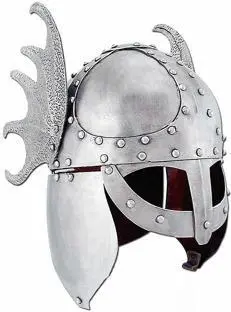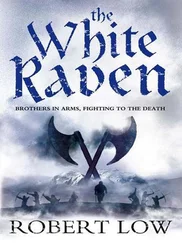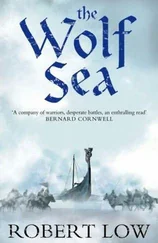They cut and leaped and spun, elbowing Dengizik's dead men aside with curses. The chamber filled with the dust of old death, the fear-stink and blood of new.
Vigfus was good, too, and I remembered him spidering across rooftops, swinging in and out of shuttered openings, leaping to grab a rope in mid-air. Fast and limber, for all that he had no sense of dress at all.
Twice Gunnar Raudi had almost lost his sword to the boarding axe, Vigfus swirling it round to trap the sword in the curve of its beard, flicking his wrist to lock it, then trying to wrench it out of Gunnar's grasp.
But Vigfus's magnificent helmet was a hindrance and you could see why sensible warriors had given that type up for one with a simple nasal: you couldn't see anything out of the corner of your eye and, in a whirling fight like this, that was suicide.
Gunnar circled. Einar came up behind him and I thought he was moving to Gunnar's sword side, to make it two on one. As he did, Gunnar Raudi stiffened, half turned—and Vigfus's axe hurled round and took him between neck and shoulder, cleaving deep in a splinter of rings and bone and blood.
My scream was lost in the echoing shrieks and yells of the battle. Einar flung himself over Gunnar's body at Vigfus, roaring his challenge, spittle flying. I half stumbled to where Gunnar lay, blood pooling thickly on the dusty floor.
He was gone, already white, barely able to speak. His lips moved in the frosted berry beard, now bright with new, vicious red spilling from his mouth. If he had something to say other than with those frantic eyes, I never heard it. When they glazed over, I closed them.
Vigfus, fingers curling on the wire-wrapped handle of his axe, crabbed sideways, elbowing aside another fighting pair, one of whom aimed a brief, speculative cut at Vigfus as he did so.
In that helmet, he almost missed it, was left off balance and clattered into another of the Oathsworn, who then stumbled into another of those dead warriors, impaling himself on an age-blackened spear.
I have been asked by bright-eyed youngsters who have never fought for their lives with shield and steel what it's like. I never tell them that it is four or five minutes of mad fear and luck, of slashing cuts and savagery, of shit and blood and shrieking.
The sagas tell it better and the one about the battle between Einar and Vigfus would, no doubt, have been memorable for its superior, clever kennings and nobility. Reality was different and vicious.
Einar, snarling, his sword dripping blood, slashed at Vigfus in a flurry of steel and Vigfus danced sideways, raised himself on his toes and swung the axe downwards in a vicious arc, screaming as he did so.
It took Einar's shield just below the rim, a solid pine on pine wheel of wood, and split it lengthwise. With a swift shrug, Einar was out of the straps, both hands on the hilt of his sword and Vigfus, still holding the buried axe, was jerked sideways by the dead weight of the dropped shield.
Too late, he released his grip. Einar's two-handed blow spanged off one side of that helmet, took Vigfus on the top of the left shoulder with the splintering crack of bone and sheared down through mail, bone, flesh and sinew until it popped out of his armpit with a sucking sound and a spray of ruined iron rings.
Vigfus roared, spun away from his falling arm and clapped his remaining hand over the great rush of blood from the stump. The second blow crushed mail rings into his ribs. The third slashed a steak out of his thigh. He went down, bellowing as Einar hacked shreds off him until there was no more noise.
The others of his crew tried to give up, but Hild would not have that. Screeching, hair flying like a Valkyrie, she demanded they all die.
Two of the Dandy's men threw down their weapons and Einar cut them down where they stood with a few swift strokes. After that, the others fought on with the desperate ferocity of the cornered, but it was short and they were all chopped to bloody ruin by packs of Oathsworn.
Then there was silence, save for the pant and gasp of ravaged lungs. Someone was puking, hard and noisy, and the impaled man was growling and yelling as others tried to lever his arm off the spear-point. The iron stink of blood was everywhere; the floor of the tomb was slushed with viscous red mud.
And I sat there in a widening slick of Gunnar Raudi's blood, his head in my lap, watching the other sluggish pool form slowly from the stab wound in his back.


Eight men were dead; twenty-four more had wounds, some of them deep. In the 12 stunned twilight of battle, Ketil Crow and Illugi took me under the armpits and hauled me up and away from Gunnar Raudi.
I let them, numbed by what I thought I knew, never taking my eyes off Einar.
Had he stabbed Gunnar Raudi in the back, hard enough to wound, to distract him?
In that half-light and confusion I turned it over and over and still it vanished like smoke.
In the end, I knew, with a deep, sick feeling, that he had, but there was nothing I could do. He was, I thought with a flush of fear, as fetch-haunted as Hild. And had broken his oath yet again in that mad moment.
Then I kept hearing Gunnar Raudi's warnings and knew, with a nauseating certainty, that I would be next.
None of it would bring Gunnar Raudi back. Illugi and I, working without a word between us while the others bound up wounds and sorted out their gear, cleaned Gunnar Raudi as best we could and laid him out on his back, hands folded on his sword. I had to tear strips off his underkirtle to bind his shoulder back to his body, rather than have that terrible gape, so like a lipless mouth.
Einar came across after we had done this, stared down at the body and where we hunkered near it. 'A good man,' he said. `He died a good death.'
I could not speak. Blood leaked into my mouth from biting the inside of my lip to keep from screaming at him: You killed Gunnar Raudi. You killed him. Like you killed Eyvind.
Einar ordered him laid at the feet of the throne, where the mouldering, fur-rotted remains of Dengizik sat, skeletal hands on the stone arms, the fur rim of his rusting helmet festering on his neck.
Everyone wanted out of that place, especially when Hild drifted like silent smoke down the stairs, to stand over the carved remains of Vigfus and smile her beautiful, fey smile.
`Dengizik has no head,' Einar noted, his voice cracked with dryness.
`The Romans took it and put it on a pole,' Hild answered, her voice seeming sucked out of her in a hiss.
'His faithless young brother Ernak, who would not stand with him against the Great City, had permission to take the body, on condition the Romans sealed the tomb, lest his fetch return. Five hundred years and more it has sat here. My mother told me this.'
There were looks flying one to another, from eyes round and white with fear. Tongues snaked over dry lips as the dust settled, mote by mote and almost sibilant. No one liked talk of a fetch in such a place.
Ìs there anything we need from here?' Einar demanded of her, his voice crow-harsh in the blood-reeked twilight.
`Not for me,' she answered, soft as the rustle of a shroud. 'But this is Atil's son and those swords were made by the same smith who forged Atil's blade from the end of the Christ spear. My distant kinsman, Regin the Volsung.'
Two swords lay across the cobwebbed, dusty brocade of Dengizik's robed lap, but no one even wanted to go near them, never mind claim them as spoil.
We left that place, treasureless and afraid, not even having looted Vigfus's men. By the time we had got back across the timber bridge—knocking it spinning into the waterfalled chasm after everyone was safely across—and down the steps, the storm had ended. The sun was out, the sky a clear-washed cloudless blue, and the ground steamed in the heat. But every leaf had a muddy wash, rapidly drying to dust in the heat.
Читать дальше
Конец ознакомительного отрывка
Купить книгу













